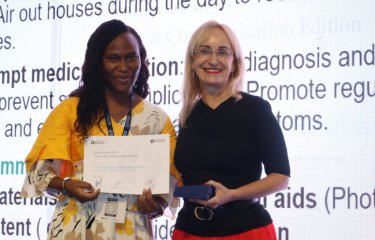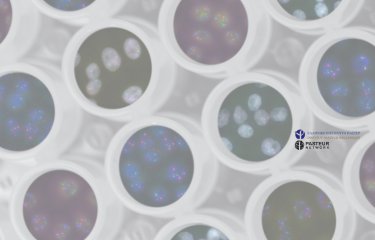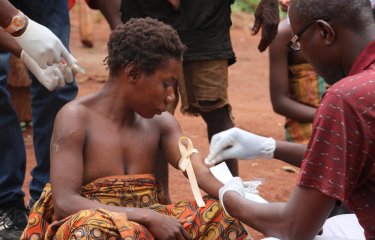World Water Day is held on March 22, 2022. The theme for this year’s edition is: "Groundwater – making the invisible visible". On this occasion, learn more about diseases related to water access – predominantly infectious diseases – in our fact sheets and some of the initiatives implemented by the Institut Pasteur in Paris and the Pasteur Network.
Water is a fundamental resource supporting life and a core component of public health surveillance. Several "aquatic" diseases affect populations in which access to water and high-quality sanitation cannot be guaranteed. World Water Day, instituted in 1994 by the United Nations Organization, is primarily intended to raise awareness of the critical issues surrounding this valuable resource. The stark reality is that there are two billion people worldwide without access to drinking water. It is also an opportunity to highlight the fact that there are several diseases related to lack of access to clean water, that are actually carried by water, or that are caused by pathogens or vectors that develop in water.
- Diseases related to lack of access to clean water
A lack of clean water makes basic hygiene practices difficult, favoring the development of several infections. Trachoma is a disease caused by the bacterium Chlamydia trachomatis. It affects the eyes and can cause blindness. The bacterium is transmitted via hands, via clothes or by flies; hygiene is therefore an important factor in preventing infection. Similarly, shigellosis is the archetype of diseases related to inadequate hygiene. It gives rise to a form of dysentery and causes diarrhea. Transmission is person-to-person; other routes are via stools that contaminate water or food, and via flies that come into contact with contaminated food items. Shigellosis is a bacterial infection caused by Shigella bacteria, which belong to the species Escherichia coli. Lack of access to water, to high-quality sanitation and lack of health education are also important factors in malnutrition.
- Waterborne diseases
In parts of the world where it cannot be sanitized, water may contain various pathogens that infect inhabitants that use it. Such is the case for the bacterium that causes cholera, Vibrio cholerae. Stools of infected people can contaminate food and water, and consequently be transmitted by consumption. The viruses causing poliomyelitis, an infection that attacks the central nervous system and can have long-term effects, or hepatitis A and E, can also be transmitted by contaminated water. Hygiene conditions and lack of wastewater treatment systems can encourage the circulation of certain parasites, such as amebas. These single-cell organisms cause amebiasis, an inflammation of the colon wall giving rise to diarrhea and even dysentery.
The risk of waterborne diseases is even present in North America, Asia and Europe; for example Legionnaires' disease, a potentially fatal disease caused by a bacterium with an affinity for modern water supply systems such as domestic hot water networks and cooling towers.
- Parasitic diseases infecting aquatic animals
Several parasitic worms that infect humans have as intermediate hosts aquatic animals, such as mollusks and crustaceans. This is notably the case for the Guinea worm, which parasitizes skin, common liver fluke and schistosomes, which can parasitize different organs. Contamination can occur while bathing in contaminated water or after eating plants contaminated by this water.
- Diseases by vectors that reproduce in water
Stagnant water provides ideal breeding conditions for mosquitoes which are vectors of several infectious diseases. The tiger mosquito (Aedes genus) is responsible for the transmission of diseases such as dengue, yellow fever and chikungunya. Malaria, a parasitic disease caused by Plasmodium, is transmitted by the bite of female mosquitoes of the Anopheles genus. In terms of annual cases worldwide, malaria is the leading parasitic disease.
In parallel with World Water Day on March 22, the 9th World Water Forum on the theme "Water Security for Peace and Development" will this year be held from March 21 to 26 in Dakar. This summit is held every three years and brings together several decision-makers to tackle current challenges in terms of water and sanitation. The 9th edition is the first to be held in sub-Saharan Africa.
In conjunction with this event, the Institut Pasteur de Dakar and Fondation Véolia are organizing a hackathon on the theme "Freshwater & Crazy Ideas." It was launched on Monday March 21, will be open for exactly one month, and will select the most innovative proposals concerning the supply and distribution of freshwater. The authors of the three best proposals will have the chance to present them to a panel of experts to determine the prizewinner.
Finally, the Institut Pasteur in Paris has launched the MOOC Water-Borne Infectious Diseases, co-led by François-Xavier Weill (Enteric Bacterial Pathogens Unit), Maël Bessaud (Viral Populations and Pathogenesis laboratory) and Dominique Franco (special advisor in the Institut Pasteur's Department of Education). This online course explains why water can transmit bacterial, viral and parasitic infections and explores ways to combat and prevent them. It will run from March 22 to May 24, 2022. Please note however that registration is open until May 18, 2022 only.
|
Spotlight on two Pasteur Network initiatives
|





